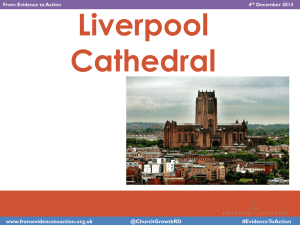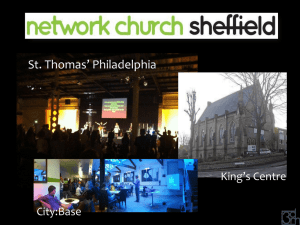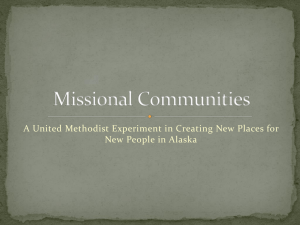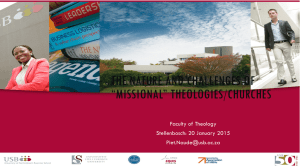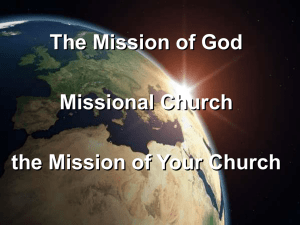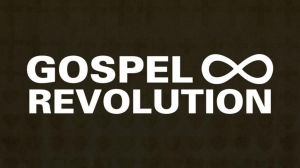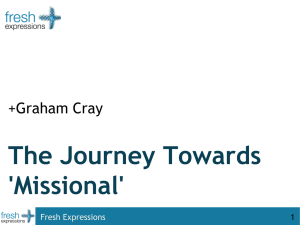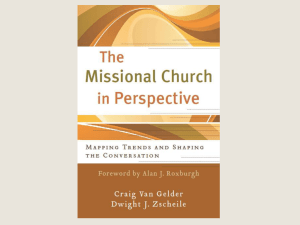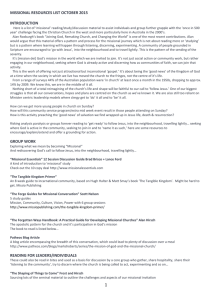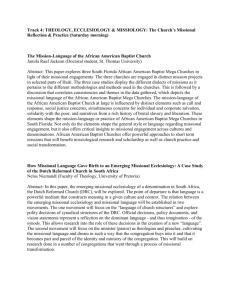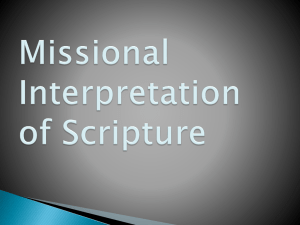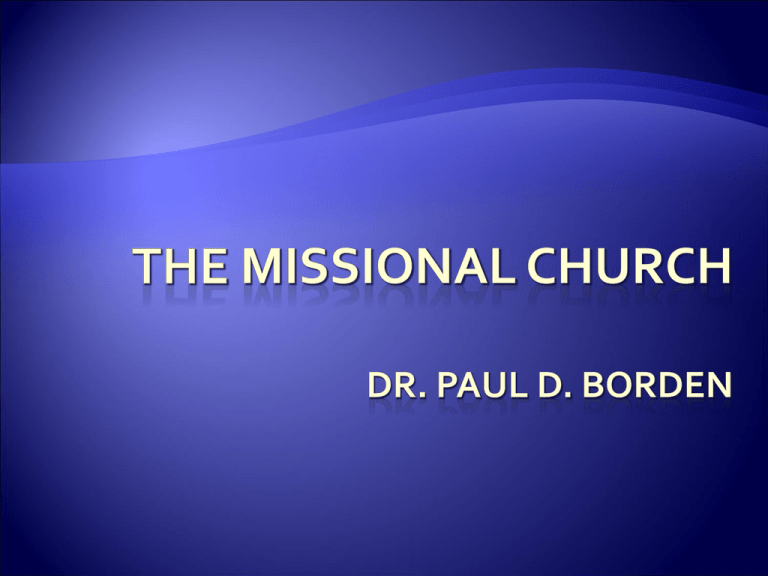
Historical Overview
1000 Years the Western World
Influenced by Christendom
Society’s Institutions Christianized People
Society’s Institutions Stigmatized nonChristian Beliefs and Behaviors
Result – People Were Cultural Christians
The Church’s Job – Challenge People
to be Regenerated
Advantages:
Common Language for Public Discourse
Society Could Discuss Good and Evil
Disadvantages:
Morality without Regeneration Produces
Hypocrisy and Cruelty
The Church was/is often Silent about Power and
Greed
Leslie Newbigin – India 1950
Saw Missional Churches in a Non-Christian
Culture
Returned to England – Saw Non-Missional
Churches in a Non-Christian Culture
World No-longer Christianized
The Church did Business as usual
Some Churches did Evangelism as a Ministry
No Churches Adapted All they did to
Reach the Non-Christian World
(Negative Description of a Missional Church)
U.S. Different From Europe, Canada and
Australia/New Zealand
Still have Two Worlds in One Nation
Heartland – Christendom (Informal Culture)
– Quickly Passing However
Cities and Coasts – Christendom gone
#1
People Learn to Discourse
in the Current Vernacular
Christendom – Little Difference in
Language Inside/Outside the Church
Missional Church –
Terms/Terminology Need
Explanation
The Missional Church Avoids:
Tribal Language
Stylized Prayer Language
Unnecessary pious “Jargon”
Archaic Language to set a Spiritual Tone
We –Them Language
Disdainful Jokes that mock Politics, Beliefs,
Behaviors
Disrespectful Comments about those who Differ
Sentimental, Pompous, Self-Fulfilling Talk
The Missional Church:
Always Acts as if Unbelievers are Present
Engages the Culture with Gentle, SelfDeprecating Joyful Irony
Communicates Empathy for Those Hurt and
Mislead by the Culture
The Missional Church Acts Differently
Because:
Hearts are Broken for Lost People
It is on a Mission of Love
The Church is not All about Us
The Missional Church Acts by:
Asking Questions and Listening
Seeing Itself as a Spiritual Guide to
Searching Pilgrims
Matching our Vision with the Vision of Lost
People
Seeking the Spirit’s Help in Developing New
Strategies
#2 We Enter and Re-Tell the
Culture’s Stories with Good
News
Christendom Motivated by Guilt
(Exhortation)
Christendom did not Listen
Missional Church - Preaching and
Communication ALWAYS Assumes:
Unbelievers are Present
That We Engage Their Stories
Sympathy and Acquaintance With
Literature
Music
Theater
The Arts Reveal the Culture’s
Hopes
Dreams
“Heroic Narratives”
Fears
Christendom: Be A Good Person – Live
Well – Be Merciful
Current Culture: Be Free – Self Created –
Authentic
Make the World Safe so all Can Live This
Way (Justice)
Christianity: Freedom without Slavery –
Embrace others without Injustice
Understand Grace and its
Stewardships
Express our Honesty (Successes and
Failures) in Living out Grace
Show How Their Stories and Our
Stories Fit the Big Story
#3 Theologically Train Lay
People for PUBLIC Life and
Vocations
Christendom:
Trained People for
Spiritual Private World Skills
The Missional Church:
People Need
to Learn to Think Christianly About
All of Life and Learn to Live with
Distinctiveness
Christians Need to Know:
Cultural Practices – Common Grace
Cultural Practices – Antithetical to
Grace
Cultural Practices – Adapted and
Revised
Honor Christians Living Well in the
“PUBLIC SQUARE”
Most Negating Factors Against
Christianity is INTOLERANCE
Robin Hood Philosophy of Ministry –
Take Power and Resources for those
Without Power and Resources
The Church is Here to Save
Individuals and Communities
#4 Create Christian Community
Which is Counter-Cultural and
Counter-Intuitive
Christendom:
Key is Fellowship
The Missional Church:
Christians
Radical Approaches to Sex, Money
and Power
Sex:
Avoid Society’s Idolization and
Former Society’s Fear
Money:
Promote Generosity in
Time, Money and Relationships
Power:
Use Power for Racial
Equality and Class Equality
Missional Church – More Committed
to Social Justice than Liberals Ever
Were
Missional Church – More Committed
to Evangelism than Fundamentalists
Ever Were
Every Aspect of Ministry Committed
to Making Disciples
Use our Power and Money for those
without Power and Money
#5 We Practice Christian Unity at
the Local Level
In Christendom –
Churches Defined Against Each Other
Denomination
Theology
Polity
Practice
Missional Church –
Defined in Relation to Culture
Spiritual Characteristics
Community Commitment
We Focus on the Kingdom not our
Denomination
We Define What is Crucial or
Foundational
Marks of a Missional Church
Love for the Community
Use of Language
Biblical Truth Engages People’s Stories
Engaged in the Arts
Deep Commitment to the Poor and
Powerless
Willing to Work with Other Christians
If Marks are Present:
Unbelievers will
Come to Learn and Stay
If Marks are not Present:
We Only
Attract Christians and people of
Christendom

